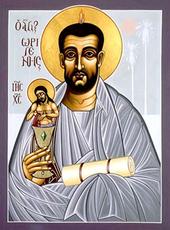Origen was an innovator in an era when innovation, for Christians, was a luxury ill-afforded. He drew upon pagan philosophy in an effort to elucidate the Christian faith in a manner acceptable to intellectuals, and he succeeded in converting many gifted pagan students of philosophy to his faith.
He was also a great humanist, who believed that all creatures will eventually achieve salvation, including the devil himself. Origen did not embrace the dualism of Gnosticism, nor that of the more primitive expressions of the Christian faith still extant in his day.
Rather, he took Christianity to a higher level, finding in it a key to the perfection of the intellect or mind, which is what all souls are in their pure form.
The restoration of all souls to a purely intellectual existence was Origen's faith, and his philosophy was based upon such a faith.
In this, he is an heir to Socrates and Plato, but he also brought a new conception into philosophy - that of the creative aspect of the soul, as realized in history, the culmination of which is salvation, after which follows an eternal delving into the deep mysteries of God.
Origen's debt to Holy Scripture is obvious; he quotes the bible at great length, often drawing together seemingly disparate passages to make a profound theological point.
Yet his thought is all the while informed by his Greek philosophical education, specifically that of the Middle Platonic tradition, notably the works of the Jewish Platonist Philo of Alexandria and the Neopythagorean philosopher Numenius of Apamea (fl. 150-176 A.D.).
Origen shares with Philo an insistence on the free will of the person, a freedom that is direct evidence of humanity's likeness to God - for, like God's Being, human existence is free from all necessity.
From Numenius, Origen likely adopted the conception of a "second god" proceeding from a first, ineffable being called the One, "First God," or Father.
Numenius referred to this "second god" as Demiurge or craftsman, and taught that he created the cosmos by imitating the intellectual content of the "First God."
Origen applied this basic notion to his doctrine of Christ, whom he also called Demiurge (Commentary on John 1.22), and went on to describe Christ as a reflection of the Truth of the Father, stating that compared to human beings Christ is Truth, but compared to the Father He is falsehood (Jerome, Epistle 92, quoting Origen; see also On First Principles 1.2.6).
Another extremely important part of Origen's intellectual heritage is the concept of apokatastasis or "restoration of all things."
This term first appears, as a philosophical concept, in the writings of the Stoics, whose materialistic pantheism led them to identify Zeus with the pure, "craftsmanly" fire pervading and constituting the cosmos.
According to the Stoics, this fire expands and contracts according to a fixed cycle. They called the contraction a "conflagration" (ekpurôsis), destroying the cosmos, yet only temporarily.
This contraction was described as Zeus returning to his own thoughts, to contemplate the eternal perfection of his mind/cosmos (the material cosmos being the expression of his mind, or Logos).
The expansion would occur when Zeus once again expressed his mind in the creation of the material cosmos; this re-creation or reconstitution of the cosmos is what the Stoics called apokatastasis.
Some Stoics argued that since Zeus is perfect mind, then every reconstitution of the cosmos will resemble identically the one that preceded it.
This Stoic doctrine was to have an immense influence on the development of the so-called esoteric traditions in the Hellenistic era, notably the Hermetic school, Gnosticism, and astrology, with all of which Origen was, in varying degrees, familiar.
In Origen's time, Christianity as a religion had not yet developed a system of theology as a basis of orthodoxy; therefore, in addition to a wide variety of opinions regarding the faith, there were also various sects, each claiming to possess the truth of the Christian faith.
Foremost among these sects was the group of schools loosely labelled 'gnostic.' The Valentinian school (founded by Valentinus, an outstanding teacher and philosopher who was at one point a candidate for bishop of Rome) was the most philosophically accomplished of the Christian Gnostic sects.
In his Commentary on John, Origen refutes the doctrines of a Valentinian Gnostic named Heracleon, who had earlier written a commentary on the same Gospel.
While Origen's opposition to Gnosticism precluded any doctrinal influence, he saw in Gnosticism the value of a system, for it was precisely by virtue of their elaborate and self-consistent systems that the Gnostics were successful in gaining adherents.
Since there were no non-Gnostic Christian theological systems in his day, it was up to Origen to formulate one. This was the program of his treatise On First Principles.
Origen's importance has largely been linked to his melding of philosophical insights with elucidations of various aspects of the Christian fatih.
reference ---- the internet encyclopedia of philosophy
http://www.iep.utm.edu/o/origen.htm
Myspace Layouts - Myspace Editor - Image Hosting
